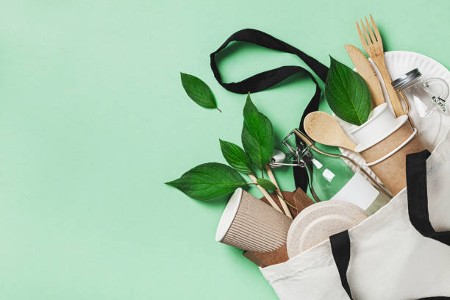Please welcome back guest blogger Uma Campbell, a freelance writer and yoga instructor from Southern California. Uma has contributed many blog posts to 21stcentech.com. She likes writing about eco-friendly lifestyles, meditation, natural medicine, and home design. And today’s topic is no exception as she discusses the steps each of us can take to try and attain a zero-waste lifestyle. You can follow Uma on Twitter at @umajcampbell.
The 7.87 billion people in the world today create two billion tons of waste per year. We see and often smell it everywhere. But even what we see and smell represents a small percentage of the total produced annually.
Some of us are motivated to attempt to implement a zero-waste lifestyle. Our reasons vary. Some simply want to make the Earth a better place for future generations. Others find that buying into sustainability saves money and time.
So what would a zero-waste lifestyle look like? Bea Johnson of Zero Waste Home suggests following the “Five R’s” of zero-waste, to get you started on your journey.
- Refuse what you do not need.
- Reduce what you need.
- Reuse by repurposing stuff.
- Recycle what you cannot refuse, reduce or reuse.
- Rot (compost) the rest.
Seems pretty simple, but let’s explore actions you can implement to achieve the “Five R’s” today.
Zero-Waste Tips & Ideas
Opt for eco-friendly options around your house
First, do some research to find the most reputable sustainable-living companies for your lighting systems, furniture and décor. Using more high-quality, sustainable materials around your home, like teak or bamboo, will save you more money in the long run, replacing cheaply made, mass-produced furniture which simply doesn’t hold up to the test of time. Consider choosing intelligent lighting and water options that you can control using technology, meaning you don’t even need to be home to reduce your home’s carbon footprint. Or if it makes sense based on location, install a propane oven to reduce your reliance on gas and electricity.
Learn to Recycle
It’s time to rethink what we do with our trash. Before throwing out something like a takeaway container or plastic bottle, consider how you could reuse it around the house. Empty soda bottles can be made into adorable bird feeders, while empty egg cartons are a great place to store small tools, earrings or screws and nails. Keep old delivery boxes for reuse when returning items, or carrying things to and from the car, and remember – an old purse or bag could be great for grocery shopping!
Use Less of Everything
It’s important to simplify and get used to using less. The more you buy, the more packaging you use, and the more factory emissions you create by proxy. Take a moment to consider if you really need the bulk package of individually wrapped toilet paper or pre-packaged lunches for the kids. Can you downsize the number of paper towels you use by substituting reusable cloth wipes? A good reusability example is reusable shopping bags. It’s estimated we could eliminate 500 single-use plastic bags per person per year by this simple substitution.
Reduce Food Waste at Home
Food waste is a major issue, and although composting is a great way to recycle food waste, it’s important to remember a commitment to a zero-waste lifestyle each time you go to the grocery store. So buy only what you need. Try to avoid individually packaged foods. If you can, grow more of your own food. You’ll hate seeing tomatoes you lovingly tended go to waste. And doesn’t it sound great to pick a fresh sprig of rosemary or basil from your garden or planters?
Save Water
This point seems particularly relevant considering water scarcity issues in many parts of the world including the western United States. So carefully consider water use as part of implementing a zero-waste lifestyle.
We take water for granted. In our western lifestyle, it flows freely and doesn’t cost a lot overall. But water conservation is important. So how can you implement it in your zero-lifestyle plan?
Here are a few ideas. Conserve water by washing clothes only when dirty. Completely fill the dishwasher or sink before you wash the dishes. Don’t pour out water used in cooking such as boiling those eggs. Instead, let it cool and use it to water your indoor and outdoor plants. Even coffee dregs can be used to fertilize plants. When you brush your teeth, don’t keep the water running. Turn it off until you need to rinse. Such small actions will have a huge impact on how much water you use daily.
A Final Note
Running a zero-waste home will help the environment and give you a great deal of satisfaction. Don’t be surprised if it also is good for your bank account. And as an example for your children, extended family, and neighbours, your lifestyle choice can become an example for others.
We know, particularly in the Western World, that we are enormous waste producers. But the solutions are right there for us to end our bad habits. So take time this weekend to consider how you can make the world a better place by changing just a few of your habits to create a more environmentally sustainable, zero-waste home and life.



















[…] This content was originally published here. […]